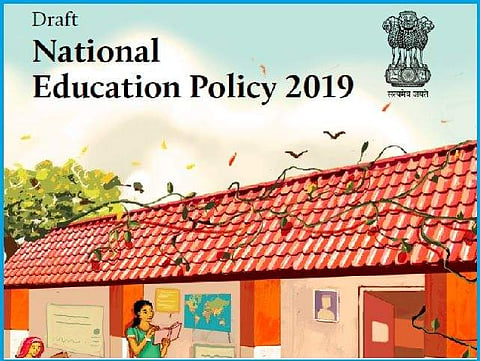

The draft National Education Policy 2019 has been drafted in view to remain relevant at least for two decades and for another 10 years thereafter after being fine-tuned, said K. Kasturirangan chairman of the drafting committee of the policy at the University of Hyderabad campus on Thursday. The public lecture on National Education Policy - 2019 was part of the University Grants Commission (UGC) two-day-long national workshop Evaluation Reforms in Higher Education Institutions focussed on the need for a policy to revamp education given its deficiencies like extreme fragmentation, particularly in higher education.
"There are 1000 universities, 40,000 colleges and 10,000 stand-alone institutions catering to 35 million students. Though 93 per cent of undergraduate enrollment is in state universities 40 per cent of them offer only single discipline. Further, 20 per cent of colleges have enrollment below 100 and only 4 per cent have enrolment above 3000," the chairman said and added that the aim is to consolidate 900 universities and 40,000 colleges to 15,000 institutions.
He said that it is important to increase public spending in education and to treat this as an investment instead of expenditure. "India's share in research and investment is 0.7 per cent as against 2.1 per cent of China and 2.6 of US and 4.3 of Israel. An annual increase of 0.2 per cent of the GDP on R&D would result in an annual increase of 1.1 per cent of GDP — fivefold return," he said.
Speaking about a query on school complexes, as proposed by the draft NEP, Kasturirangan clarified that the concept has to be worked upon and will take time to fine-tune the modalities. "It is not be taken as it is mandatory and that to set these school complexes no schools will be shut down. The idea is that once schooling is over students if they wish can take up vocational training in the same campus," he said.
Students of the University of Hyderabad staged a protest against the National Education Policy alleging that it was promoting privatisation of education by allowing the private institutions to fix their own fees.
During a lecture on the National Education Policy (NEP), members of Students Federation of India (SFI) raised slogans against the government, policy and the university administration.
Dontha Prashanth, a PhD scholar, questioned K Kasturirangan, chairman of the drafting committee of the National Education Policy 2019, on the mechanism that the draft policy adopts to ensure that the private institutions do not exert undue financial burden on the marginalised students.
Stating that there is no mechanism in place for orientation of faculty in the institutions, he said: "It would have been more appropriate if the draft suggested for developing a mechanism to prevent caste and class prejudices that exist on campuses and suggest punishment for those who discriminate. Need for orientation on inclusivity should have been made a mandatory clause to ensure institutional murders that this university has seen don't happen again and elsewhere."
Another student also raised the point that instead of addressing the problem of lack of teachers, the draft is justifying shutting down of single and double teachers schools by converting them into what are called school complexes.
